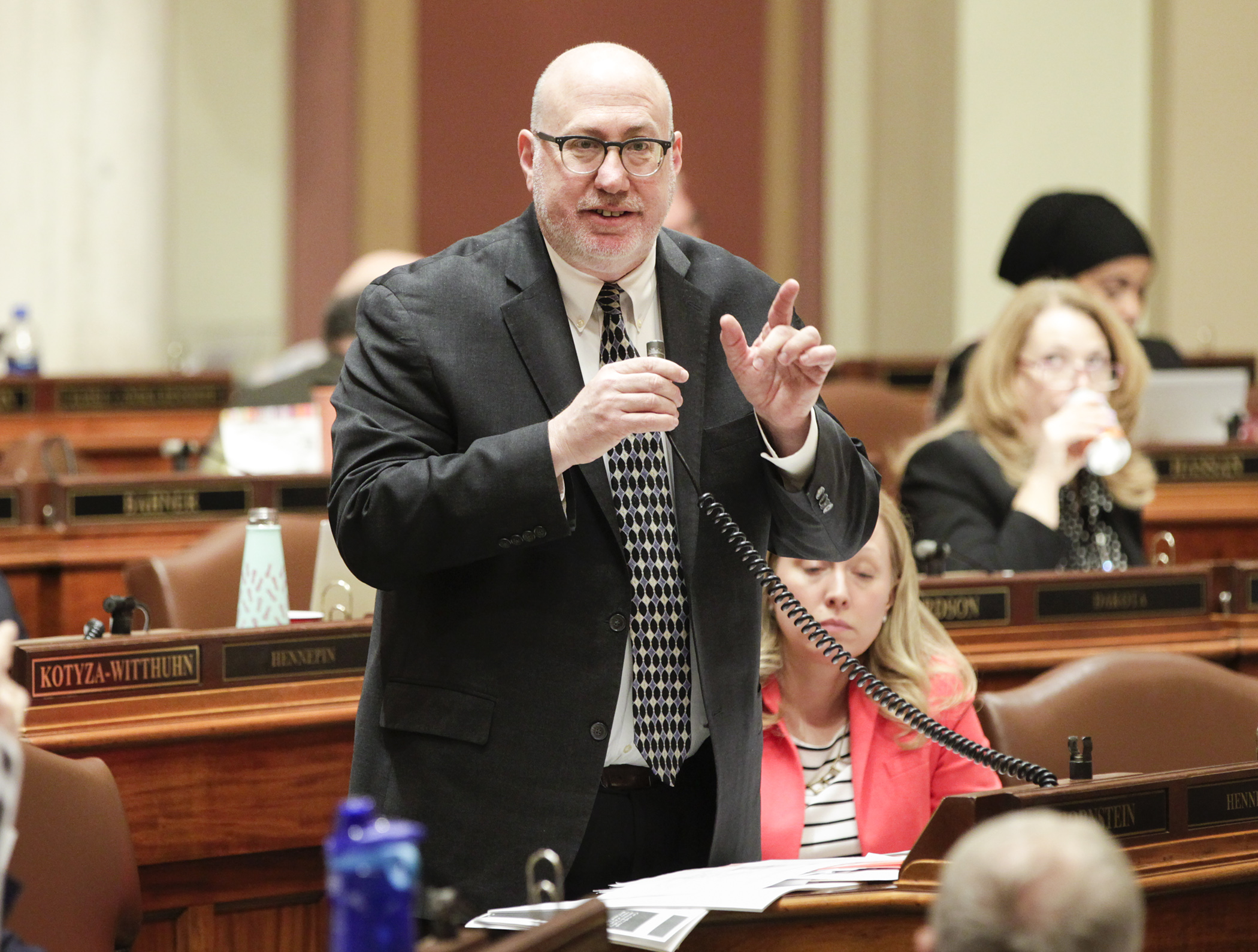After years-long effort, distracted driving bill clears the House

Minnesota roads could see fewer distracted — and dangerous — drivers after the House late Monday passed a measure aimed at cellphone use while behind the wheel.
HF50, sponsored by Rep. Frank Hornstein (DFL-Mpls), would bar drivers from holding a cellphone or other wireless communication device while operating a motor vehicle by requiring the use of hands-free devices. Passed in the House on a 106-21 vote after a years-long effort, it now goes to the Senate where Sen. Scott Newman (R-Hutchinson) is the sponsor.
If signed into law, the bill would make Minnesota the 18th state in the nation — plus Washington, D.C. — to require hands-free cellphone use if drivers want to make a call or call up directions at the wheel.
“Hang up and drive,” Hornstein said. “Your life — and the lives of your fellow travelers — depends on it.”
Distracted driving caused roughly 20 percent of crashes on Minnesota roadways from 2013 to 2017, according to Department of Public Safety statistics, and killed an average of 53 people in the state each year.
Current state law bans electronic messaging with a handheld device while operating a motor vehicle in traffic. Under HF50, all handheld mobile device usage would be banned, including making phone calls, texting, accessing applications, and playing audio or video content.
It would include exceptions for activating or deactivating features on the device using a one-touch mode, some emergency situations, and for use in emergency vehicles when used for official duties.
The bill would not increase existing penalties for violations.
Hornstein, who chairs the House Transportation Finance and Policy Division, and other lawmakers have for years tried to advance a ban on holding a cellphone while driving in an effort to save lives. Support has built in recent years, however, and a similar bill successfully navigated the committee process in 2018 before failing to come up for a floor vote in the Republican-controlled House.
Rep. Jeremy Munson (R-Lake Crystal) criticized the bill for not going far enough by continuing to allow actions like texting by voice, which he said is still too distracting. Hornstein acknowledged during a morning news conference that HF50 wouldn’t eliminate all distractions but represented an important step forward.
“Tonight we do have a chance to save lives,” Hornstein said. “And at its core, that’s what this legislation is all about.”
Rep. John Petersburg (R-Waseca) said the bill wasn’t perfect, but he dismissed complaints from some opponents of the legislation that their personal liberties are violated by the proposed ban. Cars have gotten safer, he said, but drivers have gotten more distracted.
“We have to get a handle on people’s idea that they can drive with this sort of distraction and they can do whatever they wish,” Petersburg said. “It’s time we wake up as a society.”
Public safety officials have said that in addition to making the state’s roadways safer, the bill would make it easier for law enforcement agencies to enforce the law. Under current law, drivers pulled over on suspicion of texting-while-driving can claim they were doing something else on their phone — pulling up driving directions or playing music, for example.
Traffic stop study
The legislation also includes a section that would establish a $250,000 General Fund appropriation in Fiscal Year 2020 for a “qualified research organization” to review and analyze public safety data on traffic stops and produce a report to the Legislature.
Hornstein defended the measure that was added during the bill’s trip through the committee process as an update on a similar 2003 study. The proposed traffic stop study would specifically require the review of the impact of the ban on texting while driving; the primary seatbelt law; and adoption of the 0.08 standard for drunken driving.
House Republicans attempted unsuccessfully to amend the section from the bill. Rep. Eric Lucero (R-Dayton) argued the study and its appropriation had nothing to do with the rest of the measures proposed.
“I think it’s pretty clear this [section] doesn’t belong,” he said.
Related Articles
Search Session Daily
Advanced Search OptionsPriority Dailies
Speaker Emerita Melissa Hortman, husband killed in attack
By HPIS Staff House Speaker Emerita Melissa Hortman (DFL-Brooklyn Park) and her husband, Mark, were fatally shot in their home early Saturday morning.
Gov. Tim Walz announced the news dur...
House Speaker Emerita Melissa Hortman (DFL-Brooklyn Park) and her husband, Mark, were fatally shot in their home early Saturday morning.
Gov. Tim Walz announced the news dur...
Lawmakers deliver budget bills to governor's desk in one-day special session
By Mike Cook About that talk of needing all 21 hours left in a legislative day to complete a special session?
House members were more than up to the challenge Monday. Beginning at 10 a.m...
About that talk of needing all 21 hours left in a legislative day to complete a special session?
House members were more than up to the challenge Monday. Beginning at 10 a.m...